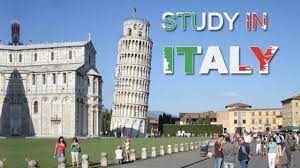Education in Italy is highly valued due to the large selection of excellent educational institutions located throughout the country, where foreign students are warmly welcomed. Italy has played an important role in the field of education, contributing to the reform of the European higher Education system within the framework of the Bologna Process. Students studying in Italy will gain valuable knowledge during classes and learn a lot about culture and history by visiting sights known all over the world.
In Italy, as in most other European countries, in grades 8-9, children complete a course of secondary education. The obtained certificate with good scores makes it possible to continue studying at an Italian university, and when choosing a high–quality pre-university studying program – at universities around the world.
After the 10th grade, upon reaching the age of 16, many students choose the program of the Italian matriculation certificate – Esame di Stato. This program is taught both in Italy and in other Italian-speaking regions of the world (for example, in Switzerland). Students at Esame di Stato are divided into groups of humanitarian and scientific orientation (exact sciences): the former, upon successful completion of the course, receive a certificate of maturity of a linguistic nature (Maturità Linguistica), the latter – a certificate of a natural science plan (Maturità Scientifica). Both give the right to enter Italian universities at selected faculties.
International colleges in Italy
International colleges in Italy – specifics of studying
Also in Italy, some educational institutions provide the opportunity to study at the International Baccalaureate (IB) program. This course is designed for students from 16 years old, lasting for two years: the list of subjects studied includes general, compulsory, and elective subjects. Thanks to the competent distribution of their forces and the correct choice of elective subjects, the student significantly increases their chances of successful admission – the IB certificate is accepted worldwide even in prestigious and ranked universities.
Scuola Media or Middle School is the next step for elementary school students when they reach the age of 11. Secondary education is 8 years of study, and it is divided into two stages, called Scuola secondaria di primo grado or first grade secondary school and Scuola secondaria di secondo grado or second grade secondary school.
This is a more formal educational institution, including both written and oral exams. The studying also includes additional classes such as music and sports. Exams at the end of the last year are crucial for obtaining a degree, as well as for obtaining higher education at universities in Italy.
Before going to high school, a student needs to decide whether he will combine education with vocational studying or study according to the standard school curriculum and prepare for university admission. Preparatory classes for admission to universities are held in lyceums of various types: pedagogical, artistic, musical, natural science, classical or lyceum of Arts. At the end of the lyceum, students take exams, according to the results of which admission to the university takes place.
In technical schools and colleges in Italy, the students undergo vocational studying, after graduation, teenagers have the right to seek work in their specialty. If a teenager decides to enter a university after college, then he needs to take an additional one-year educational course.
All programs of colleges lead to a graduation diploma, which opens the doors to any Italian university of the appropriate profile. Classes in Italian universities are most often conducted in Italian, which is why it is so important that your child gets used to a foreign country as early as possible, learns the language and gets acquainted with the mentality of Italians, which will allow him to painlessly go through the process of integration into Italian culture.
Enrolment process in the best colleges in Italy
Enrolment is not a problem in any of the schools in Italy, as the law requires schools to accept children under the age of 18, regardless of whether their documents have been submitted. In such a case, however, the guardians or parents must provide a guarantee that they will submit the necessary documentation within a certain period of time.
The documents required for registration are not very different from the documents required for other countries, and include:
-
Birth certificate;
-
EU citizens provide a residence document, while citizens of non-EU countries provide their Residence Document and a Permesso di Soggiorno (Residence Permit), which must be valid for both guardians and the child.
-
Parents’ ID card or passport to confirm identity.
-
Certificate of marital status called Stato di Famiglia.
In addition, parents or guardians will also have to provide proof of immunization against various diseases such as polio, tetanus and hepatitis B. The school authorities should also be provided with a translation of the curriculum from their home country so that they can better accommodate the child in a suitable school classroom. This will greatly facilitate the process of adaptation of the child in a new learning environment.
List of colleges in Italy – TOP 5
-
St Louis School Milan
-
International School of Milan
-
St. Stephen’s School
-
International School of Como
-
Gentium Schola Opitergium.










